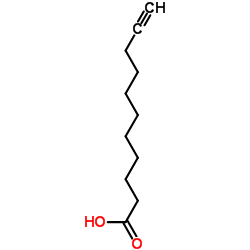Microwave irradiated click reactions on silicon surfaces via derivertization of covalently grafted poly(PEGMA) brushes.
Xiang Liu, Hong-Ning Zheng, Yin-Zhou Ma, Qing Yan, Shou-Jun Xiao
Index: J. Colloid. Interface Sci. 358(1) , 116-22, (2011)
Full Text: HTML
Abstract
Two surface chemistry approaches were realized to complete click reactions at covalently grafted polymer brushes of poly(poly(ethylene glycol) monomethacrylate) on a planar silicon surface (Si-g-P(PEGMAOH)). On one hand, the hydroxyls from Si-g-P(PEGMA-OH) brushes can be replaced by chlorines of thionyl chloride and then chlorines can be substituted with azides of sodium azide to achieve azide-terminated (Si-g-P(PEGMA-N(3))) brushes. On the other hand, the terminal acetylene (Si-g-P(PEGMA-CH(2)C[triple bond]CH)) brushes can be prepared easily by reaction between Si-g-P(PEGMA-OH) and propargyl bromide. Model compounds of acetylene-terminated propargylamine, propiolic acid, and 10-undecynoic acid as well as azide-terminal benzyl azide were chosen to investigate the surface click reactions catalyzed with Cu(II)/sodium L-ascorbate by microwave irradiation under very mild conditions at 30°C for 1h. The stepwise modifications were characterized by two surface-sensitive techniques, Multiple Transmission-Reflection Infrared Spectroscopy (MTR-IR) and X-ray Photoelectron Spectroscopy (XPS), and their spectra were analyzed in detail. The triazole ring v(H-C=) stretching at 3139 cm(-1) and the XPS high-resolution scan of N 1s directly confirm the click reactions. By quantifying their infrared spectra before and after click reactions, we conclude that the click reactions on silicon surfaces by microwave irradiation possess high yield and efficiency. Hence, the microwave irradiated click reaction approaches might open convenient avenues to fabricate functional and hybrid organic/silicon devices.Copyright © 2011 Elsevier Inc. All rights reserved.
Related Compounds
| Structure | Name/CAS No. | Molecular Formula | Articles |
|---|---|---|---|
 |
10-Undecynoic acid
CAS:2777-65-3 |
C11H18O2 |
|
Simultaneous electropolymerization and electro-click functio...
2014-05-27 [ACS Nano 8(5) , 5240-8, (2014)] |
|
Amphiphilic polyesters derived from silylated and germylated...
2009-04-13 [Biomacromolecules 10(4) , 850-7, (2009)] |
|
Cellulose/water: liquid/gas and liquid/liquid phase equilibr...
2007-06-01 [Biomacromolecules 8(6) , 1865-72, (2007)] |
|
Mechanism-based in vivo inactivation of lauric acid hydroxyl...
1986-08-12 [Biochemistry 25(16) , 4705-11, (1986)] |
|
10-Undecynoic acid, an inhibitor of cytochrome P450 4A1, inh...
1999-01-01 [Acta Biochim. Pol. 46(1) , 203-10, (1999)] |